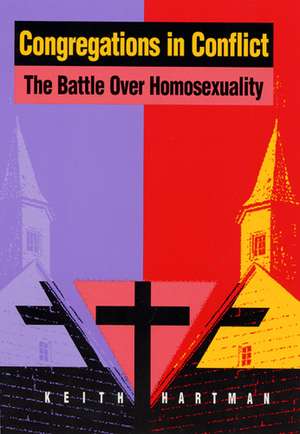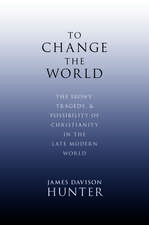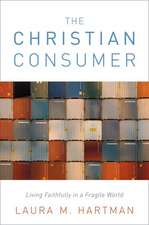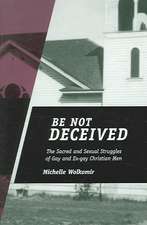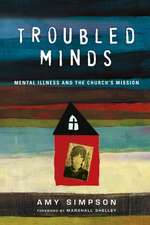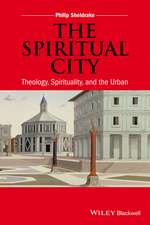Congregations in Conflict: The Battle over Homosexuality
Autor Keith Hartmanen Limba Engleză Paperback – dec 1996
A Methodist church puts its minister on trial after he marches in a gay rights parade. A Quaker meeting struggles to decide whether to marry a lesbian couple. An entire congregation is thrown out of the Southern Baptist Convention for deciding that a gay divinity student had a sincere calling to the ministry, and an order of celibate monks comes out of the closet. An Episcopal priest blesses two same-sex relationships--then a closeted gay lawyer leads the charge to have him fired.
Homosexuality is the most divisive issue facing churches today. Like the issue of slavery 150 years ago, it is a matter that ignites passionate convictions on both sides, a matter that threatens to turn members of the same faith against each other, to divide congregations, and possibly even to fragment several denominations. Like slavery, it is an issue that calls up basic questions about what it means to be a Christian. How does one know right from wrong? Is the Bible fallible? Do good Christians always follow their church's teachings, or are they allowed to think for themselves on moral issues? And to what source does one finally look to determine what God really wants?
While many books have been written analyzing the scriptural and theological dimensions of the conflict, none has yet shown how it is being played out in the pews. Congregations in Conflict examines nine churches that were split by disagreements over gay and lesbian issues, and how the congregations resolved them.
Hartman explores in very readable prose how different denominations have handled their conflicts and what it says about the nature of their faith. He shows some churches coming through their struggles stronger and more unified, while others irrevocably split. Most importantly, he illuminates how people with a passionate clash of beliefs can still function together as a community of faith.
Homosexuality is the most divisive issue facing churches today. Like the issue of slavery 150 years ago, it is a matter that ignites passionate convictions on both sides, a matter that threatens to turn members of the same faith against each other, to divide congregations, and possibly even to fragment several denominations. Like slavery, it is an issue that calls up basic questions about what it means to be a Christian. How does one know right from wrong? Is the Bible fallible? Do good Christians always follow their church's teachings, or are they allowed to think for themselves on moral issues? And to what source does one finally look to determine what God really wants?
While many books have been written analyzing the scriptural and theological dimensions of the conflict, none has yet shown how it is being played out in the pews. Congregations in Conflict examines nine churches that were split by disagreements over gay and lesbian issues, and how the congregations resolved them.
Hartman explores in very readable prose how different denominations have handled their conflicts and what it says about the nature of their faith. He shows some churches coming through their struggles stronger and more unified, while others irrevocably split. Most importantly, he illuminates how people with a passionate clash of beliefs can still function together as a community of faith.
Preț: 266.42 lei
Nou
Puncte Express: 400
Preț estimativ în valută:
50.98€ • 52.91$ • 42.61£
50.98€ • 52.91$ • 42.61£
Carte tipărită la comandă
Livrare economică 18 martie-01 aprilie
Preluare comenzi: 021 569.72.76
Specificații
ISBN-13: 9780813524245
ISBN-10: 0813524245
Pagini: 212
Dimensiuni: 152 x 229 x 15 mm
Greutate: 0.34 kg
Ediția:None
Editura: Rutgers University Press
Colecția Rutgers University Press
ISBN-10: 0813524245
Pagini: 212
Dimensiuni: 152 x 229 x 15 mm
Greutate: 0.34 kg
Ediția:None
Editura: Rutgers University Press
Colecția Rutgers University Press
Notă biografică
KEITH HARTMAN is a journalist and freelance writer whose work has appeared in numerous mainstream and gay publications. He lives in Atlanta, Georgia.
Cuprins
The generation gap : Fairmont Methodist
The fellowship of believers : Pullen Baptist
License to preach : Binkley Baptist
The class of 1992 : Duke Divinity School
The long-term cost : The Reverend Jim Lewis
A place to meet : St. John's Metropolitan Community Church
The Quaker process : Chapel Hill Friends meeting
A challenge for the process : Durham Friends meeting
Race, the Vatican, and inclusiveness : Holy Cross
The fellowship of believers : Pullen Baptist
License to preach : Binkley Baptist
The class of 1992 : Duke Divinity School
The long-term cost : The Reverend Jim Lewis
A place to meet : St. John's Metropolitan Community Church
The Quaker process : Chapel Hill Friends meeting
A challenge for the process : Durham Friends meeting
Race, the Vatican, and inclusiveness : Holy Cross
Recenzii
A fascinating and timely collection of case studies, each of a particular congregation trying to make sense of itself and its beliefs in a changing world. Individually, they reveal the internecine struggles that lie behind all public debates about sexuality and church doctrine. Together, they are a rich landscape of organized religion in contemporary America.
Hartman's message is a hopeful one. . . . A readable, thought-provoking study of the fomentations of faith within a community and within a congregation.
One comes away from Mr. Hartman's book with a renewed appreciation of the diversity and vigor of religious life in this country. At a time when fanatics of various stripes use faith as a smokescreen for intolerance and hate, it is valuable to be reminded that religious belief can foster a spirit of compassion and understanding.
Fascinating, highly-readable array of human stories. . . . Hartman has written the first book that reveals how the competing principles are being played out in the pews.
A tremendous resource for churches grappling with the issue.
An invaluable beginning to the healing of misunderstanding on all sides.
Descriere
While many books have been written analyzing the scriptural and theological dimensions of the conflict, none has yet shown how it is being played out in the pews. Congregations in Conflict examines nine churches that were split by disagreements over gay and lesbian issues, and how the congregations resolved them. Hartman explores in very readable prose how different denominations have handled their conflicts and what it says about the nature of their faith. He shows some churches coming through their struggles stronger and more unified, while others irrevocably split. Most importantly, he illuminates how people with a passionate clash of beliefs can still function together as a community of faith.
